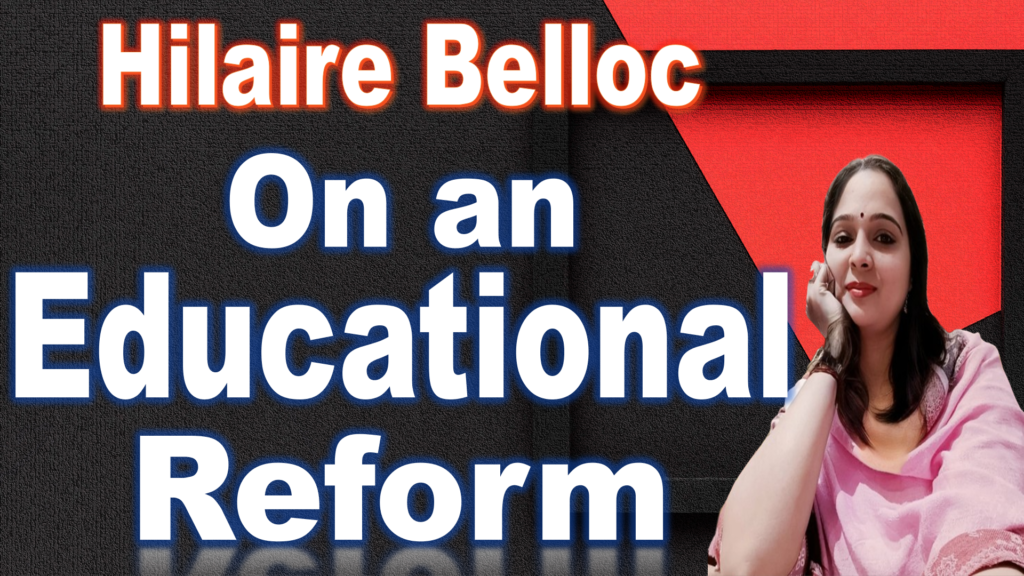
On an Educational Reform by Hilaire Belloc | On an Educational Reform | Summary | Word Meaning | Questions Answers | Free PDF Download – Easy Literary Lessons
On an Educational Reform
Since we are determined (as I am not, but as all my colleagues seem to be) that a new world has arisen ; since, therefore, all institutions may be remodelled at will, I trust there will appear in the education of wealthy children a reform overdue these many years.
This reform is an addition, of a certain subject, to the curriculum of schools. We have all at one time or another deplored its absence: we all, in one crisis or another of our lives, recognise its necessity. If it be true that we have today an opportunity for new things, do let us inaugurate this novelty at least, which would be of such vast advantage to the generation now sprouting. And the new subject is Fraud.
Fraud is the sole basis of the only form of success recognised among us. By Fraud alone are those vast fortunes suddenly acquired which and which only are the condition of greatness in a modern man.
Fraud is the master subject, ignorance or inability in which (looms a man to toil and obscurity. Yet Fraud is never taught at school. Men who had the parts for a most brilliant career fail on leaving the Academies because they are outwitted by Guttersnipes who have no letters but can cheat.
There used to be taught in schools Latin and Greek after a grammatical fashion, which made the better pupils true masters of the inwards of these languages. When they were so formed they were called “scholars.” To this expertise was added some knowledge of a foreign language (usually French or German, but only a smattering thereof), and latterly also the elements of physical science and of mathematics, until these last branches took up so much time that often a choice was made between them and the older humanities.
So far, so good. Indirectly the young people were taught also the manner of their society, and this especially through the modern discipline of games. But there is not one of them (and I speak with feeling on the matter, for I have experience myself) who upon leaving school or the University has not suddenly found himself in a world where a ready practice in cheating proved the only thing of serious importance and yet was to him quite unfamiliar. He found himself, usually without resources, cast upon a world, wherein survival (or even decent honour and spiritual security) depended upon the exercise of certain arts of deceit to which he had never been trained, and which he must acquire at his peril. In proportion as he failed to acquire these arts lie failed altogether and was cast away.
Every one will admit that the swindling of one’s fellow beings is a necessary practice. Upon it is based all really sound commercial success, and through it men arrive at those solid positions which command the honour and respect of our contemporaries. Thus, the chief way of making money is by buying cheap and selling dear, or, rather, by buying cheap and selling dear quickly; but when you buy cheap you only do so by taking in the vendor, and, when you sell dear, the purchaser. Your action may be remote and indirect, as when you gamble upon the Stock Exchange. It is commonly direct and personal as when you acquire under contract the services of another man. But it is essentially an exercise in overreaching. It is of its very nature getting some other human being into a state of mind in which he underestimates what you desire to get out of him or overestimates what you desire to unload upon him. Thus, in my own poor trade, I am a good business man if I can persuade some unhappy publisher or newspaper owner that the public is athirst for my words. Conversely, my honourable employers and masters will be good business men if they persuade me that no one is so base as to want to hear me at all, and that I am only employed as a sort of charity. And so it is with the selling of a boat or a house, or with the buying of land.
Another mastergate to fortune is abuse of confidence: you persuade men to entrust you with money for one purpose and then use it secretly for a very different end. If you bring off the deal it is your gain. If you drop the money the loss is theirs.
Another royal road is “merger”; another false description; another plain straightforward theft.
All these repose on a sound talent in Fraud, and, in general, so it is in all forms of fortunegetting, save in the highly specialised craft or mystery of blackmail. Upon cheating all honour, and therefore all happiness, depends. It is wealth so made which (save for those who inherit wealth and who are securely tied up as well) determines the position of a man today among his fellows.
Well, what trace is there of this great truth in the curriculum of our schools? It is entirely neglected! I admit that pomposity, which is a necessary element in all success, is indirectly taught. I admit still more freely and fully that the spirit of falsehood is taught as a sort of general subject, but I maintain that swindling as a particular subject is not taught at all, and even the most elementary forms of it, with which every boy ought to be acquainted in his early ‘teens, come upon him with a shock when he is already a young married man launched in life and, as the phrase goes, battling with the world.
This, I say, is a shameful neglect. Here is an instance: the most elementary form of swindling, that which is, as it were, the gambit of every operation, and that which is the sum total of all the simpler operations of commerce, consists in giving a verbal assurance which it is intended to repudiate later by document or action. You promise a man something which you do not intend to perform, or you give a false description which reality will later expose, or in some other way you use the psychology of affirmation to your advantage.
Well, what could be simpler than to have a class (even if it were but half an hour a week) where all boys over a certain age could be trained by example both to be upon their guard against the false affirmation of others and (what is more important) to make false but plausible affirmations themselves with all the boldness which breeds success to make affirmations particular, affirmations emphatic, affirmations probable, affirmations flattering.
Even the negative side of this very necessary piece of training is omitted, and boys are not taught (at least in any school with which I have acquaintance) the importance of economy in falsehood.
The immature mind will, of course, tend to falsehood as a natural human instinct, but the force of kindly nature is here wasted because it lacks direction. Young men go out into the world lying freely about the grandeur of their acquaintance, their personal prowess, and the rest , all matters conducing in no way to the accumulation of wealth which is the end of man. Now, what could be simpler than, in such a class as I suggest (I admit that half an hour a week is rather short commons, but everything must have a beginning)what could be simpler than to give some direction at least to this pseudological factor in the mind and train it to the right end?
Examples should be set before youth. Let the master recite some braggart story of strength or skill such as is common among the young of the rich. Then let him show what a waste of energy it is, and how an equal amount of pseudological force expended in a useful channel, a false description or a flattery, might have earned £1OO. “It is just as easy,” the good preceptor would tell his young charges, “to brag about a horse that you want to sell as about, say, your horsemanship, for which there is no market. It is just as easy to lie about the value of something you have for sale as it is to lie about your lineage. But in the first case you trouser the dibs, while in the second there is no stuffit is wasted effort. Remember, therefore, my dear boys, to check yourselves when you are about to tell an uneconomical falsehood. Count ten before you speak and consider whether there be not ready to your hand some subject in which you can fully satisfy this natural instinct of lying and at the same time prepare some advantage for your pocket.”
It may be objected to me that if this very necessary reform were introduced and the elements of modern commerce were taught in all our schools, the results would cancel out; for since all our youth would be forearmed, there would still be waged in the great world outside the conflict of the better sharper against the worse, with victory as now to the masterthief. But such an objection applies to all forms of learning. My desire is to raise the general level of our gentry in this department, and especially not to leave the men in middle age with the bitter memory of lost opportunities: opportunities lost through no personal fault but through the neglect of those who had a sacred trust and who did not fulfill it. At least let the man of fifty be able to say to himself: “I had every advantage. My masters at school (and no one more than my dear old headmaster, Dr. Buggins) repeatedly warned me against the peril of honesty and were at pains to teach me how to overreach the innocent; if I have proved clumsy and am now living as a publisher’s hack, the fault is all with me.” As things now are, many a man who has sunk to be a proofreader, or even and author, is, in his heart, bitterly reproaching those who launched him upon the world quite ignorant of affairs.
I conceive that the educationist who is ever eager to improve his changing science will here suggest particular subjects in this new department. He will see an expanding hoizon of opportunity. My words have roused enthusiasm in him. He will ask me, of instance, who I have not included special classes in blackmail, monopoly, bullying, bribery, perjury, and so forth.
Yes, certainly; all these should have their place, especially for older boys. But they may well be considered later. Perhaps such subjects would best be left to special institutions, such as those which were so successful in the last generation under the name of “crammers.” Blackmail in particular, very like the art of outflanking in military science, requires a judgment of the world to which the mind can hardly attain till it is mature. Napoleon said: “Beware when you attempt to outflank that you be not outflanked yourself”; a sound saying, for any one in process of edging round his opponent extends his own communications and leaves an opportunity for that opponent to edge round him. And so it is with blackmail; too often the blackmailer just in the act of seizing his prize (a post in the Ministry or what not) feels a sharp bite and discovers to his horror that the tables are turned.
In a word, the teaching of this art of blackmail is the teaching of a very difficult and skillful, complex action which must not be attempted rashly, and that is why I have some hesitation in recommending it for the ordinary curriculum of schools. Nevertheless, the very rudiments of it, or, at any rate, some idea of what it is, might profitably be given even to the younger boys, and for this purpose I would suggest a visit to some neighboring aquarium, where the slow antics of the crab in his tank so graphically mimic our public life. The attention of the lads could be directed by their master to the alternate furtive movements of two crabs. They will observe how the first pursues the second sideways across the tank and makes a clutch with his claw, how the second eludes this and in his turn chases his opponent off. “This grotesque manuvre, my dear boys,” the Pastor will declaim, “may remain in your minds as an example of what later you will be called upon to do if you are called to serve your country in Parliament.”
The youngsters will soon forget all about it as is the fashion of boys with their lessons; but something, I think, will remain in the mind,, though half obscured by time. And when they come to the vast affairs of which Westminster is the theatre, the object lesson of the two crabs. will not be without service to them.
Bribery, I take it, should not be taught except in the point of degree, for it comes naturally enough to all men both to give and to take bribes, and all that you need fix in the young mind is the double importance of avoiding avarice upon the one side and lavishness upon the other. For the taking of a bribe no art or training whatsoever is required, but in the giving of bribes it is of some importance not to give too much, and of absolutely vital importance not to offer too little. It is upon this last point that many a noble career, has made shipwreck.
I have in mind one poor fellow whose father had left him a few millions. He was perpetually gutting down, with all manner of hesitation, sums just insufficient to purchase the object of his desires. In the long run he had disbursed what should easily have commanded a high administrative position in the Cabinet, a Viceroyalty or a first class Embassy. Yet he had nothing to show for it all but one private secretaryship, two chairmanships of committee, and a baronetcy: and this last only because he was childless.
Summary
The essay “On an Educational Reform” by Hilaire Belloc discusses the need for a significant change in the education system to address the realities of the modern world, particularly in regard to the teaching of Fraud. Belloc begins by acknowledging the prevailing belief among his colleagues that a new era has dawned, where all institutions can be reshaped according to contemporary needs. He asserts that within this context, it is high time for a long-overdue reform in the education of wealthy children.
Belloc argues for the inclusion of Fraud as a subject in the curriculum of schools, highlighting its essential role in achieving success in contemporary society. He contends that Fraud is the foundation of the only form of success recognized in modern times, whereby vast fortunes are swiftly amassed, thus determining one’s greatness. Despite its paramount importance, Belloc notes that Fraud is never formally taught in schools, leading to the failure of many talented individuals who are outwitted by those skilled in deceit.
The essay delves into the historical curriculum, which traditionally emphasized subjects like Latin, Greek, and mathematics, eventually incorporating physical science and modern languages. While these subjects provided a foundation of knowledge, Belloc argues that they failed to prepare students for the practical realities of life, particularly in the realm of commerce and social interaction.
Belloc emphasizes the ubiquity of Fraud in various aspects of life, from business transactions to interpersonal relationships. He discusses how success often hinges on one’s ability to deceive others, whether through false promises, misleading descriptions, or manipulation of trust. Belloc contends that the lack of education in Fraud leaves individuals ill-prepared to navigate the complexities of the modern world, leading to missed opportunities and personal setbacks.
The author advocates for the introduction of Fraud as a formal subject in schools, alongside traditional disciplines. He suggests that students should be taught the principles of deceit, including techniques for convincing persuasion and strategic manipulation. Belloc believes that such education will equip students with the necessary skills to succeed in a society where Fraud is pervasive.
Furthermore, Belloc acknowledges potential objections to teaching Fraud in schools, particularly concerning ethics and morality. However, he argues that understanding the mechanics of Fraud is essential for safeguarding oneself against deception and exploitation. He contends that by imparting knowledge of Fraud, educators can empower students to make informed decisions and uphold integrity in their actions. In conclusion, “On an Educational Reform” advocate for a comprehensive overhaul of the education system to incorporate the teaching of Fraud as a vital subject. Belloc asserts that by equipping students with an understanding of deceit, schools can better prepare them for the challenges and realities of contemporary society.
Key Points
Author
Hilaire Belloc was a French-born British writer and historian. He was one of the most prolific writers in England during the early 20th century. Belloc was known for his essays, poetry, and historical works. His writings covered a wide range of topics, from history and politics to religion and travel. Belloc’s works are characterized by his clear and direct language, his strong opinions, and his satirical wit.
Introduction
The essay “On an Educational Reform” begins with Belloc expressing his skepticism towards the widespread belief that a new world has arisen, and thus, all institutions can be remodeled at will. He proposes a reform in the education of wealthy children, which he believes is long overdue. This sets the stage for the arguments and discussions that follow in the essay.
Structure
The structure of an essay refers to the way its content is organized. In the case of “On an Educational Reform”, Belloc presents his argument, provides examples, and draws conclusions. The text provided seems to be the introduction or the first part of the essay. The specific structure of the essay (such as the number of paragraphs, the progression of ideas, etc.) can only be determined by reading the entire essay.
Setting
The setting of an essay is the broader context in which the discussion takes place. In “On an Educational Reform”, the setting is the educational system and society at large during Belloc’s time. He discusses the values and practices of his society and their implications on education.
Theme
The theme of an essay is its central idea or message. In “On an Educational Reform”, the central theme is the role of fraud in achieving success in society. Belloc argues that fraud is the basis of the only form of success recognized in his society, and yet, it is not taught in schools.
Style
The style of an essay refers to the way the author uses language to express his ideas. Belloc’s style is characterized by his clear and direct language. He uses irony and satire to critique societal norms and values. His arguments are presented in a logical and coherent manner, making his essays engaging and thought-provoking.
Message
The message of an essay is the main point or argument that the author is trying to convey. In “On an Educational Reform”, Belloc’s message is a critique of the societal values that equate success with wealth and the acquisition of vast fortunes through fraudulent means. He argues for the inclusion of ‘Fraud’ as a subject in the curriculum, not to promote dishonest practices, but to prepare students for the realities of the world they are about to enter.
Hilaire Belloc
Birth and Early Life
Hilaire Belloc was born as Joseph Hilaire Pierre René Belloc on July 27, 1870, in La Celle-Saint-Cloud, France.
His mother was Bessie Rayner Parkes, a prominent women’s activist, and his father was Louis Belloc, a French lawyer.
After the death of his father in 1872, Belloc and his mother moved to England.
Education
Belloc was educated at the Oratory School in Birmingham.
He later attended Balliol College, Oxford, where he graduated with first-class honors in history in 1894.
Career
Belloc had a diverse career as a writer, historian, orator, poet, sailor, satirist, soldier, and political activist.
He worked as a journalist before his military service.
Belloc was also a member of Parliament for Salford from 1906 to 1910.
Writing
Belloc was a prolific writer, known for his essays, poetry, and historical works.
His writings covered a wide range of topics, from history and politics to religion and trave.
Some of his notable works include “The Four Men”, “The Path to Rome”, and “Europe and the Faith”.
Personal Life
In 1896, Belloc married Elodie Hogan, and they had five children2.
He became a naturalized British subject in 1902.
Death
Belloc died on July 16, 1953, in Guildford, Surrey, England.
Legacy
Belloc’s Catholic faith had a strong effect on his works.
He is remembered for his clear and direct language, his strong opinions, and his satirical wit. Belloc’s works continue to be read and studied for their literary merit and their insightful commentary on society, politics, and religion.
Word Meaning
| Tough Word | Meaning in English | Meaning in Hindi |
|---|---|---|
| Remodelled | Altered or modified in structure or form | पुनः ढांचे या रूप में परिवर्तित |
| Reform | Make changes in (something, typically a social, political, or economic institution or practice) in order to improve it | सुधार |
| Overdue | Not having arrived, happened, or been done by the expected time | विलंबित |
| Curriculum | The subjects comprising a course of study in a school or college | पाठ्यक्रम |
| Deplored | Feel or express strong disapproval of (something) | निंदा करना |
| Sprouting | Begin to grow or develop | उगना |
| Fraud | Wrongful or criminal deception intended to result in financial or personal gain | धोखा |
| Looms | Appears as a vague form, especially one that is large or threatening | उभरना |
| Toil | Hard and continuous work | कठिन परिश्रम |
| Obscurity | The state of being unknown, inconspicuous, or unimportant | अज्ञातता |
| Outwitted | Defeat or get the better of (someone) by being clever or cunning | होशियारी से हरा देना |
| Guttersnipes | A child who spends most of their time in the streets, especially in slum areas | असहय्य |
| Pupils | A student in school | छात्र |
| Smattering | A small amount of something | थोड़ी सी मात्रा |
| Deceit | The action or practice of deceiving someone by concealing or misrepresenting the truth | धोखा |
| Peril | Serious and immediate danger | जोखिम |
| Swindling | Use deception to deprive (someone) of money or possessions | ठगी |
| Dear | Expensive / costly | महंगा |
| Vendor | A person or company offering something for sale, especially a trader in the street | विक्रेता |
| Gamble | Play games of chance for money; bet | जुआ |
| Persuade | Cause (someone) to do something through reasoning or argument | प्रेरित करना |
| Merger | The combining of two or more organizations into a single entity | विलय |
| Blackmail | The action, treated as a criminal offense, of demanding money from someone in return for not revealing compromising or damaging information about them | ब्लैकमेल |
| Pomposity | The quality of being pompous; self-importance | अहंकार |
| Acquainted | Make someone aware of or familiar with | परिचित |
| Battling | Engaged in a prolonged fight or war | लड़ाई |
| Gambit | An act or remark that is calculated to gain an advantage, especially at the outset of a situation | षड्यंत्र |
| Repudiate | Refuse to accept or be associated with | ठुकराना |
| Plausible | Seeming reasonable or probable | संभावित |
| Affirmations | The action or process of affirming something | पुष्टि |
| Emphatic | Showing or giving emphasis; expressing something forcibly and clearly | प्रभावी |
| Flattering | Full of praise and compliments | खुशामद |
| Omitted | Leave out or exclude (someone or something), either intentionally or forgetfully | छोड़ देना |
| Grandeur | Splendor and impressiveness, especially of appearance or style | भव्यता |
| Acquaintance | A person one knows slightly, but who is not a close friend | परिचित |
| Prowess | Skill or expertise in a particular activity or field | कौशल |
| Pseudological | Of or relating to pseudologic | अधार्मिक |
| Braggart | A person who boasts about their achievements or possessions | डींग मारने वाला |
| Preceptor | A teacher or instructor, especially one at a college or university | शिक्षक |
| Stuffit | A file compression and archive utility | फ़ाइल संक्षेपन और संग्रहीत उपयोगिता |
| Waged trouser the dibs | Carry on (a war or campaign) | युद्ध करना |
| Gentry | People of good social position, specifically (in the UK) the class of people next below the nobility in position and birth | उच्च वर्गीय |
| Sacred | Connected with God (or the gods) or dedicated to a religious purpose and so deserving veneration | पवित्र |
| Clumsy | Awkward in movement or in handling things | असावधान |
| Reproaching | Address (someone) in such a way as to express disapproval or disappointment | दोष लगाना |
| Roused | Bring out of sleep; wake up | उत्तेजित करना |
| Enthusiasm | Intense and eager enjoyment, interest, or approval | उत्साह |
| Monopoly | The exclusive possession or control of the supply of or trade in a commodity or service | मोनोपॉली |
| Bullying | Seek to harm, intimidate, or coerce (someone perceived as vulnerable) | उत्पीड़न |
| Bribery | The giving or offering of a bribe | घूस |
| Perjury | The offense of willfully telling an untruth in a court after having taken an oath or affirmation | झूठी गवाही |
| Crammers | A person who prepares for an examination by memorizing information | क्रैमर्स |
| Outflank | Gain an advantage over (someone) by moving faster or being more prepared | पराजय देना |
| Seizing | Take hold of suddenly and forcibly | पकड़ना |
| Rudiments | The first principles of (an art or subject) | आधार |
| Crab | A crustacean with a broad carapace, stalked eyes, and five pairs of legs, the first pair of which are modified as pincers | केकड़ा |
| Lads | A boy or young man (often as a form of address) | लड़के |
| Furtive | Attempting to avoid notice or attention, typically because of guilt or a belief that discovery would lead to trouble | गुप्त |
| Clutch | Grasp or seize (something) tightly or eagerly | क्लच |
| Grotesque manoeuvre | A strange, bizarre, or ludicrous action or movement | विचित्र मानवरण |
| Pastor | A minister in charge of a Christian church or congregation | पादरी |
| Declaim | Utter or deliver words or a speech in a rhetorical or impassioned way, as if to an audience | प्रस्तावित करना |
| Obscured | Not discovered or known about; uncertain | अज्ञात |
| Westminster | A district in central London, England, historically containing the principal offices of the British government | वेस्टमिनस्टर |
| Avarice | Extreme greed for wealth or material gain | लालच |
| Shipwreck | The destruction of a ship at sea by sinking or breaking up, typically caused by storm or collision | डूबना |
| Gutting | Remove the internal organs of (fish or poultry) prior to cooking | |
| Viceroyalty | The office, position, or authority of a viceroy | वाइसराय का पद |
| Baronetcy | The rank or office of a baronet | बैरोनेट की उपाधि |
Very Short Answer Questions
Q: Who is the author of the essay “On an Educational Reform”?
A: The author is Hilaire Belloc.
Q: What is the main theme of the essay?
A: The main theme is the role of fraud in achieving success in society.
Q: What reform does Belloc propose in the essay?
A: Belloc proposes the inclusion of ‘Fraud’ as a subject in the curriculum.
Q: What does Belloc believe is the basis of success in society?
A: Belloc believes that fraud is the basis of success in society.
Q: What does Belloc criticize in the essay?
A: Belloc criticizes societal values that equate success with wealth and fraudulent means.
Q: What is the setting of the essay?
A: The setting is the educational system and society at large during Belloc’s time.
Q: What style does Belloc use in the essay?
A: Belloc uses a clear and direct language with irony and satire.
Q: What is the structure of the essay?
A: The essay follows a logical structure, with Belloc presenting an argument, providing examples, and drawing conclusions.
Q: What does Belloc suggest is necessary for survival in society?
A: Belloc suggests that a ready practice in cheating is necessary for survival in society.
Q: What does Belloc believe is the only thing of serious importance in society?
A: Belloc believes that the ability to cheat is the only thing of serious importance in society.
Q: What does Belloc believe is the chief way of making money?
A: Belloc believes that the chief way of making money is by buying cheap and selling dear.
Q: What does Belloc refer to as a mastergate to fortune?
A: Belloc refers to the abuse of confidence as a mastergate to fortune.
Q: What does Belloc believe is a necessary practice in society?
A: Belloc believes that swindling one’s fellow beings is a necessary practice in society.
Q: What does Belloc believe is the condition of greatness in a modern man?
A: Belloc believes that the acquisition of vast fortunes through fraudulent means is the condition of greatness in a modern man.
Q: What does Belloc believe is the only form of success recognized in society?
A: Belloc believes that the acquisition of vast fortunes through fraudulent means is the only form of success recognized in society.
Q: What does Belloc believe is the result of ignorance or inability in fraud?
A: Belloc believes that ignorance or inability in fraud dooms a man to toil and obscurity.
Q: What does Belloc believe happens to men who fail to acquire the arts of deceit?
A: Belloc believes that men who fail to acquire the arts of deceit fail altogether and are cast away.
Q: What does Belloc believe happens to men who are outwitted by guttersnipes?
A: Belloc believes that men who are outwitted by guttersnipes fail in their careers.
Q: What does Belloc believe is the result of the absence of fraud in the curriculum?
A: Belloc believes that the absence of fraud in the curriculum leads to men being unprepared for the realities of the world.
Q: What does Belloc believe is the result of the inclusion of fraud in the curriculum?
A: Belloc believes that the inclusion of fraud in the curriculum would prepare students for the realities of the world.
Short Answer Questions
Q: What is the central argument that Belloc presents in his essay “On an Educational Reform”?
A: In his essay “On an Educational Reform”, Belloc presents the argument that the education system should include ‘Fraud’ as a subject in its curriculum. He believes that the ability to cheat or deceive is a necessary skill for survival and success in society, and yet, it is not taught in schools.
Q: How does Belloc define success in society in his essay?
A: Belloc defines success in society as the acquisition of vast fortunes through fraudulent means. He argues that this is the only form of success recognized in his society.
Q: What critique does Belloc make of societal values in his essay?
A: Belloc critiques societal values that equate success with wealth and the acquisition of vast fortunes through fraudulent means. He believes that these values are flawed and lead to a society where dishonest practices are rewarded.
Q: What does Belloc propose as a solution to the problems he identifies in the education system?
A: Belloc proposes the inclusion of ‘Fraud’ as a subject in the curriculum as a solution to the problems he identifies in the education system. He believes that this would prepare students for the realities of the world they are about to enter.
Q: How does Belloc use irony and satire in his essay?
A: Belloc uses irony and satire to critique societal norms and values. For example, he ironically proposes the teaching of ‘Fraud’ in schools, not to promote dishonest practices, but to highlight the importance society places on such practices for achieving success.
Q: What does Belloc believe is the result of the absence of fraud in the curriculum?
A: Belloc believes that the absence of fraud in the curriculum leads to men being unprepared for the realities of the world. He argues that a ready practice in cheating is necessary for survival in society, and yet, it is not taught in schools.
Q: What does Belloc believe is the result of the inclusion of fraud in the curriculum?
A: Belloc believes that the inclusion of fraud in the curriculum would prepare students for the realities of the world they are about to enter. He argues that this would equip them with the necessary skills to navigate a society where success is often equated with the ability to deceive.
Q: How does Belloc’s essay reflect his views on education and society?
A: Belloc’s essay reflects his views on education and society by critiquing the societal values that equate success with wealth and fraudulent means, and by proposing a reform in the education system to better prepare students for the realities of the world.
Q: What is the significance of the title “On an Educational Reform”?
A: The title “On an Educational Reform” signifies Belloc’s intention to discuss and propose a reform in the education system. The reform he proposes is the inclusion of ‘Fraud’ as a subject in the curriculum.
Q: How does Belloc’s essay contribute to discussions on education and societal values?
A: Belloc’s essay contributes to discussions on education and societal values by presenting a unique perspective on the role of education in preparing students for society. He critiques societal values that equate success with fraudulent means and argues for a reform in the education system to address this issue.
Essay Type Questions
Write the critical appreciation of the Essay.
Theme and Message The central theme of the essay is the role of fraud in achieving success in society. Belloc presents a satirical critique of societal norms that equate success with wealth and the acquisition of vast fortunes through fraudulent means. He argues that the ability to deceive or cheat is a necessary skill for survival and success in society. However, he points out the irony that despite its importance, this skill is not taught in schools. This theme is presented in a satirical manner, highlighting the irony of a society that rewards dishonest practices while failing to prepare its youth for this reality.
Style and Tone Belloc’s style is characterized by his clear and direct language. He uses irony and satire to critique societal norms and values. His arguments are presented in a logical and coherent manner, making his essays engaging and thought-provoking. The tone of the essay is critical and somewhat cynical, reflecting Belloc’s skepticism towards societal values and the education system. His use of irony and satire not only adds a layer of humor to his writing but also serves to underscore the absurdity of the societal norms he is critiquing.
Structure and Organization The essay follows a logical structure, with Belloc presenting his argument, providing examples, and drawing conclusions. This structure allows for a clear progression of ideas and makes the essay easy to follow. The essay begins with an introduction where Belloc presents his argument about the need for educational reform. This is followed by the body of the essay where he provides examples and evidence to support his argument. The essay concludes with Belloc summarizing his points and presenting his final thoughts.
Relevance and Impact The essay’s message is still relevant today, as it raises important questions about the values we instill in our youth and the skills they need to navigate society. It challenges readers to reflect on their own values and the role of education in society. The essay’s impact lies in its ability to provoke thought and stimulate discussion about these important issues.
Critique While the essay’s message is powerful, it could be argued that Belloc’s view is somewhat cynical and one-sided. He seems to suggest that success can only be achieved through fraudulent means, which is a rather bleak view of society. Furthermore, the proposal to include ‘Fraud’ as a subject in the curriculum is controversial and may not be the best solution to the problems he identifies. Some might argue that instead of teaching students how to deceive, we should be teaching them how to detect and combat fraud.
In conclusion, “On an Educational Reform” is a compelling critique of societal values and the education system. It challenges readers to reflect on these issues and consider the role of education in preparing students for the realities of the world. Despite its controversial message, the essay’s clear language, logical structure, and thought-provoking arguments make it a noteworthy piece of literature. It serves as a reminder of the importance of critical thinking and ethical behavior in society.
Write long note on Hilaire Belloc as Essayist.
Early Life and Education Joseph Hilaire Pierre René Belloc, known as Hilaire Belloc, was born on July 27, 1870, in La Celle-Saint-Cloud, France. His father was a French lawyer and his mother was English. After the death of his father when Belloc was only two, his mother moved the family to England. Belloc was educated at the Oratory School in Birmingham and later attended Balliol College, Oxford, where he graduated with first-class honors in history. His early life and education laid the foundation for his future career as a writer and historian.
Career as an Essayist Belloc was one of the most versatile English writers of the first quarter of the 20th century. He was known for his essays, which were characterized by their lucidity and easy grace. His essays could be delightfully about nothing or decisively about some of the key controversies of the Edwardian era. As an essayist, he was part of a small, admired, and dominant group of popular writers, although he sometimes came across as too opinionated, and too dedicated a Catholic controversialist.
Style and Contributions Belloc’s essays are noted for their clarity, elegance, and wit. His simple prose style marked the end of the mannerisms and conventional classical images of the 17th century. His writing skill led to his holding important posts in government while the Whigs were in power. His essays often dealt with contemporary issues of public interest and reflected his views on politics, history, and culture. His clear and direct language made his essays accessible to a wide audience.
The Path to Rome In “The Path to Rome” (1902), he interspersed his account of a pilgrimage on foot from Toul to Rome with comments on the nature and history of Europe. This work is considered one of his most significant contributions as an essayist. It showcased his ability to weave personal experiences with broader reflections on history and culture.
Legacy Belloc’s essays are considered masterpieces of English literature, and they contributed significantly to the development of the English essay. His works continue to be read and studied for their literary merit and their insightful commentary on society, politics, and religion. His clear, elegant, and witty style of writing, combined with his insightful observations and reflections on society, make his essays a pleasure to read. His work in “The Path to Rome”, in particular, remains one of his most significant contributions, influencing not just their contemporaries but also future generations of writers.
In conclusion, Hilaire Belloc’s contributions as an essayist have had a profound impact on English literature. His clear, elegant, and witty style of writing, combined with his insightful observations and reflections on society, make his essays a pleasure to read. His work in “The Path to Rome”, in particular, remains one of his most significant contributions, influencing not just their contemporaries but also future generations of writers. His essays continue to be relevant today, offering timeless insights into human nature and society. His unique perspective and thought-provoking commentary have cemented his place as one of the most influential essayists of his time. His legacy continues to inspire and influence writers and readers alike. His work serves as a testament to the power of the written word and the enduring relevance of thoughtful, well-crafted essays. His essays not only entertain but also provoke thought and stimulate discussion, making them a valuable addition to any literary collection. His work continues to be celebrated for its literary merit, its insightful commentary, and its timeless relevance.





